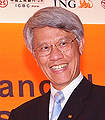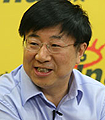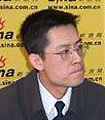| Illustrious Banker Retires

Joseph Yam Chi-kwong, Chief Executive Officer of the Hong Kong Monetary Authority since its establishment in April 1993, will retire on October 1, the Hong Kong Special Administrative Region (HKSAR) government said on May 19.
Yam, 62, began his civil career as a statistician in 1971. He was appointed principal assistant secretary for monetary affairs in 1982, and deputy secretary for monetary affairs in 1985. He was director of the Office of the Exchange Fund before becoming head of the Monetary Authority, Hong Kong's de facto central bank.
Yam is known for his involvement in establishing Hong Kong's U.S. dollar peg exchange rate regime in 1983 and for his role in fighting the Asian financial crisis in 1998 together with then Financial Secretary Donald Tsang.
Tsang, now Chief Executive of the HKSAR, said Yam is "a competent, committed and outstanding leading financial official." Tsang believes Yam's departure will not affect Hong Kong's monetary policies, the operation of the Monetary Authority or the stability of the financial system.
Energy Expert Optimistic

Han Wenke, an energy expert with the Chinese Government, has assured energy security for China over at least a decade.
Speaking at an international seminar on energy security in Asia in Beijing last month, Han, Director of the Energy Research Institute under the National Development and Reform Commission, attributed the situation to an emerging development mode featuring low energy consumption growth but high economic growth.
The annual energy consumption growth in China was about 4 percent in 2008, compared with 15 percent in 2003 and 16 percent in 2004.
Han predicted that China, the world's second largest energy consumer, would be able to keep annual energy demand growing at about 4 percent while the economy grew at around 8 percent due to intensified efforts to raise energy efficiency. However, Han warned that the percentage of imported oil to China's total use would jump to 60 percent in 2020 from 50 percent nowadays.
Screenwriter's Cannes Surprise

Mei Feng, an associate professor at the Beijing Film Academy, won the prize for best screenplay at this year's Cannes Film Festival for Spring Fever, a 116-minute movie that describes the romantic entanglements between three friends--two men and a woman.
Since most viewers were critical about the movie after it premiered in Cannes on May 13, Mei's award was unexpected to most Chinese movie industry insiders, including Mei himself.
In an earlier interview with China's Web portal sina.com, Mei said that he touched on male homosexuality, still a taboo in China, in Spring Fever, because extreme lover relationships are more dramatic, though the movie focused more on the average person's emotional interdependence.
Mei received a master's degree in moviemaking from the Beijing Film Academy in 1998. He also participated in writing the screenplay Purple Butterfly and Summer Palace, which were in competition in the Cannes Film Festival in 2004 and 2006.
"If democracy is an event, China has not made breakthroughs. If it is a process, it is happening in China."
Cheng Li, a senior fellow at the John L. Thornton China Center of the Brookings Institution, at a May 22 congressional executive hearing on China's democracy over the past three decades and its implications for the United States
"We have to learn from each other as we go forward. So that is the subject."
U.S. House Speaker Nancy Pelosi, speaking to reporters on May 23 before kicking off her first China visit after assuming office
"It is easy to get in, but almost impossible to get out."
U.S. President Barack Obama, decrying small print on credit card statements containing traps for unwary borrowers when he signed sweeping credit card reforms into law on May 22
"We shall have to build up to come back to the high growth track as early as possible."
India's new Finance Minister Pranab Mukherjee, pledging to protect the economy from the adverse impacts of the global slump and return the country to a high growth path
"For those who are directly or implicitly lobbying against climate action I have a clear message: Your ideas are out of date and you are running out of time."
UN Secretary General Ban Ki-moon, speaking to a meeting of more than 500 business leaders in Denmark on May 24
"What began as a great financial crisis and became a great economic crisis is now becoming a great crisis of unemployment, and if we don't take measures there is a risk of a great human and social crisis, with major political implications."
World Bank President Robert Zoellick, in an interview with Spanish Sunday newspaper El Pais | 